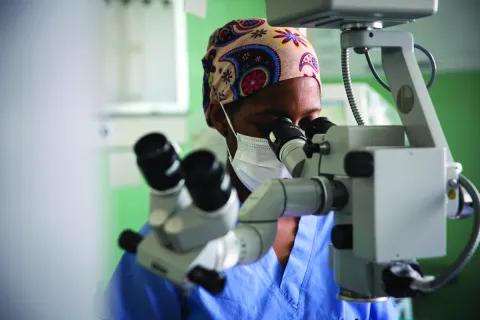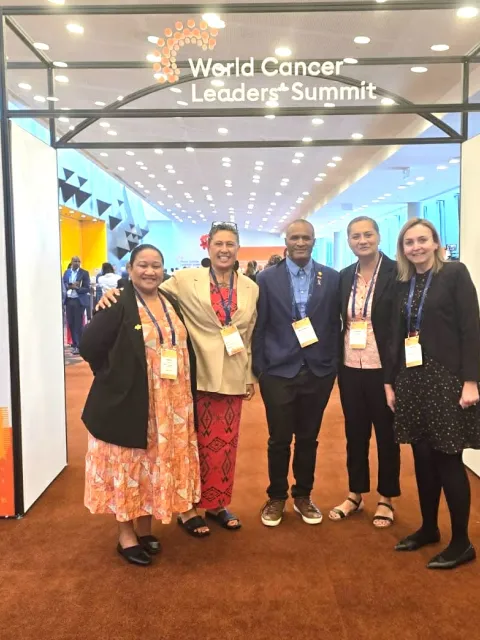Innovations in cancer care bring health closer to patients in LMICs
Innovations and resource-appropriate interventions can help close the equity gap in cancer care between high- and lower-income regions. Interview with Dr Omolola Salako of the Sebeccly Cancer Centre in Nigeria.

Dr Omolola Salako is a Clinical oncologist and Founder and Executive Director of the Sebeccly Cancer Care and Support Centre, a not-for-profit organisation that conducts cancer outreach and survivorship programmes in Nigeria. The Sebeccly Centre is a launchpad for several innovative programmes such as the Oncopadi Digital Clinic, a tech-driven platform that connects and empowers people concerned about cancer. The ambition is to leverage technology to advance cancer care in Africa. The Sebeccly Cancer Care and Support Centre celebrates its 15th anniversary this year in September.
Dr Salako is also a social entrepreneur, digital health innovator and winner of the 2020 UICC Best CEO Award for her leadership work in fighting cancer and inequity in health, and creating a safe space for people affected by cancer. She is the Principal Investigator of the X-Labs Digital Health Hub, a leadership development platform that cultivates the innovative potential of future healthcare leaders and aims to build the future digital and oncology workforce in Nigeria. She is a lecturer at the College of Medicine, University of Lagos.
Dr Salako, could you tell us about how digital technology is being used to advance cancer care in Nigeria?
In Nigeria, there are digital health initiatives that are providing access to accurate information, navigation and welfare support to cancer patients. Many of these initiatives are led by self-starters who identify problems in cancer care and go on to create solutions to reduce the impact of cancer. These innovations include Notitia, MobiPINK, mDoc and Oncopadi. Several studies are also ongoing to assess the feasibility and acceptability of digital health interventions amongst people impacted by cancer.
Oncopadi is the foremost web and mobile app offering cancer care access to the Nigerian population, by connecting patients to the necessary treatment and survivorship resources and services. Through digital health, we are providing inspiration and impact as an integrated community of solidarity, education, health services and access, focusing on supporting patients with cancer.
Depending on the location, socioeconomic status and spending power of a person, it may take them two to 12 weeks to connect with an oncologist in a health care facility. The ratio of a clinical oncologist to new cancer patients in Nigeria is 1 to 1,250 compared to 1 to 137 in the US. This paucity of clinical oncologists (only 100 in Nigeria) is further worsened by the concentration of oncologists in cities.
To tackle some of these problems as a country, we have to promote and invest in cancer care innovation, simply because it is a low-hanging fruit. If you review some of the brilliant home-grown solutions and innovations, you will appreciate the potential to solve the cancer public health crisis. Secondly, Nigeria is the most populous nation in Africa with over two hundred million people, of which more than half have an internet-enabled device. With an internet penetration rate of 50%, many organisations using digital health are channelling cancer awareness messages as well as support and advocacy campaigns to reduce the disparity of cancer care.
At Sebeccly, we believe that every patient should have access to an oncologist as required on their cancer journey. Practically speaking, however, problems can also arise with referrals, as patients themselves don’t know where to go or who an oncologist is, and general practitioners sometimes are unable to refer patients quickly to oncology clinics. This is where Oncopadi can really help. It assists with patient navigation and drive more patients earlier to treatment, it is the “Uber of cancer care”.
The pandemic has no doubt disrupted the delivery of cancer services in Nigeria as elsewhere. But do you see a “silver lining”? Has the pandemic accelerated transformations and changes in the way care is delivered?
The COVID-19 pandemic reduced access to physical cancer care and disrupted clinical services. The only silver lining is increased requests for and adoption of digital health services. During the lockdown, a lot of patients and caregivers migrated online in search for cancer care information and support, effectively becoming e-patients. We are glad that they found Oncopadi and used one or more of the app features to solve their concern. In managing e-patients and their needs this past year, we grew from 250 users to 1,000+ users and launched our mobile app during the pandemic.
Oncopadi app users utilised digital cancer care in one of three ways at the height of the pandemic:
- Patients who benefitted from stay-at-home care with some support; they were assessed and told how to manage symptoms, while we dispatched medications to the patients’ homes through our partner pharmacies; as needed, we also arranged for a health practitioner to visit the patient.
- Patients who needed on-site treatment; following telemedicine consultations, we assessed and triaged patients in critical situations to the few clinics accepting patients. Our work for these people was founded on real-time information and operations of oncology clinics around the country. It involved navigating patients to the appropriate facility, which included, at the peak of the pandemic, finding out which ones had remained open – as well as understanding the patients’ stories, their medical background, and providing them with their symptom history in a well-written summary that they could show to law enforcement agents enforcing lockdown measures and/or that could present to the oncology the hospital on arrival.
- Patients requiring palliative and supportive care; we provided counselling and grieving support for families.
The digital transformation is not only taking place among patients. Many medical institutions have also invested in digital technology. Oncopadi is fortunate to have three facilities using the app as its software and, as we build our enterprise model, we intend to expand its reach and impact.
What other innovations are you seeing in cancer care, particularly in Nigeria and other low- and middle-income countries, which can help improve access to earlier diagnosis and more efficient treatment as well as help close the equity gap with higher-income countries?
We are seeing innovative financing models, with more investments from the private sector and more partnerships between private and public sectors for cancer care, particularly regarding funding and developing modern cancer care facilities. We can’t rely only on the government to invest in cancer care. We need the funds and efficiency of the private sector, so we are excited by the increasing intent and investment of the private sector in oncology.
We are also seeing promising clinical trials in oncology, with more collaboration on research, including an increased focus on cancer diagnosis. Molecular and genomic testing are also emerging, but it still remains mostly unaffordable and therefore inaccessible for the general public.
Other solutions are being developed around digitising and harmonising the records of cancer patients, from the community level to the tertiary or hospital level, which should improve the quality of cancer data and provide a large database that will be open to the use of artificial intelligence to read imaging reports, greatly assisting the work of specialists.
There was quite a bit of talk about immunotherapy and cancer vaccines on World Cancer Day. How do you see the future of oncology in the coming decades? And again, do you think LMICs, which carry the highest burden of cancer, can share in this progress?
Cancer care in the next decade will be more personalised, with more personalised tests and medicines available. Patients will be genetically profiled, with genetic mutations identified and treated accordingly.
But we are a long way off. As long as 95% of Nigerians continue to pay out of pocket, such life-saving medicines will be out of reach. Also, African cancer patients are underrepresented in oncology clinical trials. Yet with our diversity in biology, culture and environment, it is no surprise that different races will respond to cancer treatment in unique ways. What works for an Asian may not work for an African and what works for an African may not work for a Caucasian. Therefore we need to increase representation of Africans in clinical trials by building our own capacity and embracing our genomic sovereignty.
“Resource-appropriate interventions” that can have a measurable impact on cancer incidence and mortality do not always have to be technologically based. Could you tell us about some of the projects you have developed with Sebeccly Cancer Care?
Certainly, “innovation” does not have to be technological. A project can be innovative in the way it serves a community and helps achieve the objective of informing people on cancer, reducing inequity, facilitating access to care and increasing the chances of survival.
For instance, we worked with the Lagos State Ministry of Health to conduct a community campaign “Time to screen”, a breast and cervical outreach programme that has screened about 12,000 women and we are set to screen 8,000 women in 2021 with the support of ACT Foundation. This programme has created a partnership model that increases access to cervical cancer screening and treatment of precancerous lesions.
“Battle Scars” is breast cancer survivorship photo exhibition featuring stories of women who have undergone treatment for breast cancer, aimed at sensitising the public about breast cancer and raising support for women living with cancer. In partnership with Camara Studios, the stories told through the images show that cancer can be treated successfully if we detect more cancer cases early and navigate them to the right cancer clinic. But also, importantly, the exhibition destigmatised how women with breast cancer are perceived.
Sebeccly also launched 1K4Cancer, a crowd fundraiser to support the cost of care and welfare of patients on active treatment. Increasingly, the 1K4Cancer campaign is a digital fundraiser to finance not only treatment, such as chemotherapy, but also transportation and food, and can even provide an allowance for patients in need.
Finally, I think we must encourage people living with cancer to speak out and share their experiences. This is an effective way of focusing public and government attention on the need to improve cancer care. In 2015, we had the pleasure of attempting a Guinness World Record to form the largest human awareness ribbon made up of 7,598 people. When people impacted by cancer tell their stories, they help change the narrative, by exposing what must be improved on and attracting resources to address these gaps. They shine the light on what should be done but that is not being done. Patient advocates are our most important stakeholders, they need a seat at the table.
Last update
Thursday 05 August 2021
